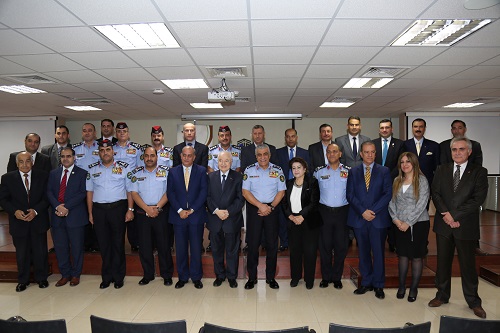Director of Public Security Inaugurates a Workshop on Human Trafficking at TAG-Knowledge Forum
12 Nov 2017AMMAN-Attended by Major General Ahmed Sarhan Al Faqih, Director of Public Security (PSD), and HE Dr. Talal Abu-Ghazaleh, the Human Trafficking Unit of the Criminal Investigation Department in cooperation with Talal Abu-Ghazaleh Organization (TAG-Org) held a workshop on "Jordan's Efforts to Combat Human Trafficking" at Talal Abu-Ghazaleh Knowledge Forum.

"Human trafficking is a crime which constitutes a fundamental violation of the international human rights standards set forth in the conventions and protocols supplementing the United Nations Convention on Combating the Organized Crime and the Optional Protocol on Human Trafficking and Exploitation and that combating, controlling and reducing such cases promotes Jordan's international standing in this field,” he said.
Maj. Gen. Al Faqih added that Jordan has taken great strides in combating the crime of human trafficking and is at the forefront compared to other countries in implementing the law that criminalizes and punishes such cases at the level of the whole region.
He also stressed that the Public Security Directorate is always striving to renovate its strategy, plans and programs to combat and caution against such cases in cooperation with all relevant entities. He continued saying that the convening of this workshop is the best evidence of the vital role played by national institutions in combating this crime, enhancing their preventive role against it and raising awareness of its consequences with the aim of finding an integrated national system to coordinate all efforts in combating this crime.
For his part, Dr. Abu-Ghazaleh hailed the measures taken by the PSD in combating crime. He also commended its genuine partnership with all components of society and institutions by involving them in the security system in their respective fields. He added that such efforts will result in the establishment of one core goal for security officers and society, which is to maintain the security and stability of society as a whole and to stand against and combat crimes in all its forms and variants.
Dr. Abu-Ghazaleh pointed out that such meetings support this concept and promote the role of national institutions and their understanding of human rights and the mechanism to protect them from any violations. He underscored that the goal of holding such workshops is to discuss legislative and institutional measures to harmonize anti-trafficking laws with international principles and standards.
Mr. Basel Al Tarawneh, the Government Coordinator for Human Rights, stressed: "We are all striving to activate all laws related to human rights. Also we aim at ensuring the development of all relevant laws to reach the highest international standards in this context."
He pointed out "It is important to tackle the crime of human trafficking which is a violation of the basic principles of human rights in Jordan. Undoubtedly, Jordan has made great strides in this field by working all together to confront it and to refer the perpetrators to justice. These efforts and measures were fruitful in terms of achieving the lowest rate in registered cases of this crime globally."
The workshop included the discussion of several research papers delivered by specialists in the field of combating human trafficking and the preservation of human rights. The panelists also addressed the most prominent cases handled by the competent authorities, in addition to providing proposals by participants for developing mechanisms of work, as well as cooperation and coordination with the national institutions and concerted efforts to combat this crime.





